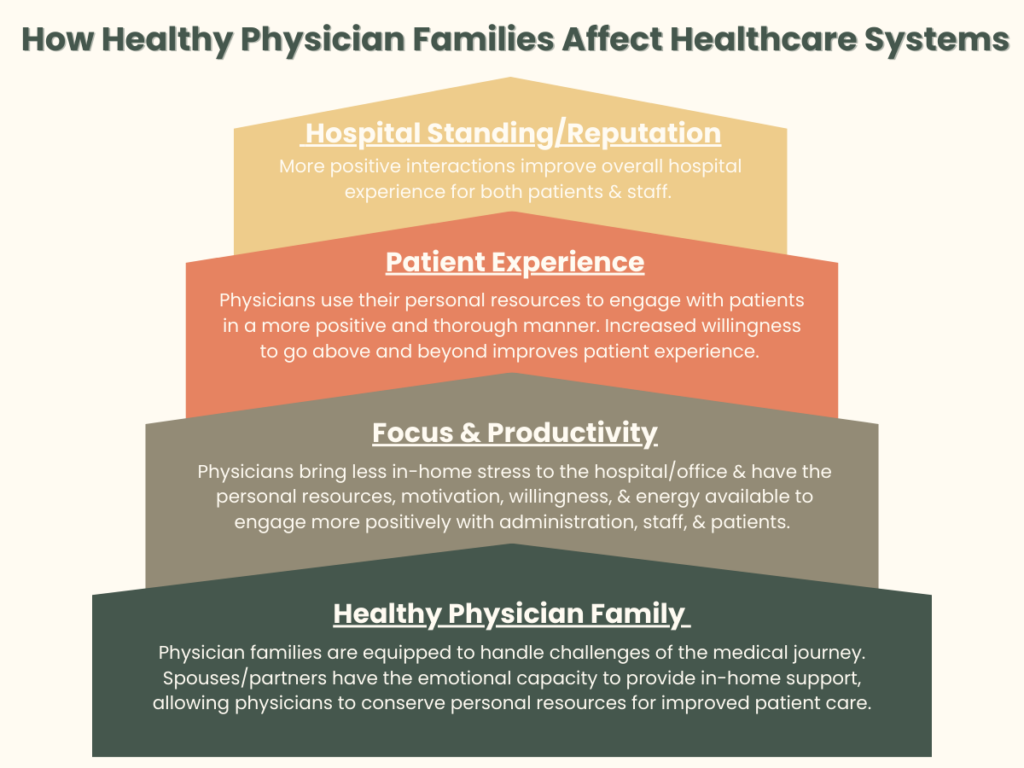SERIES: HARNESSING THE POWER OF THE PHYSICIAN FAMILY
In the first article of our series “Harnessing the Power of the Physician Family” we shed light on the importance of adopting a holistic approach to physician well-being. This approach involves understanding and valuing the vital role physician families play as the foundation of their support system and a building block to improved physician well-being. Now we delve into the influence of a supportive physician family on a physician’s productivity and focus and explore the factors that can wane familial support, impacting said productivity and focus. We’ll also discuss simple ways families, medical programs, healthcare systems, and practices can mitigate this threat, resulting in a more productive workforce and improved patient care.
Physician Productivity & Focus
It’s been shown that employees with a strong support system at home report higher levels of work engagement and job performance and are more likely to engage positively with colleagues. This, of course, also applies to physicians. This kind of engagement fosters a culture of collaboration, teamwork, and job satisfaction among physicians and staff and can even extend to improved patient care and experience.
Studies show that we possess finite personal resources and when depleted, as they are during familial stress or conflict, we knowingly withhold additional effort, thereby accepting a decline in work performance as a way to conserve these resources. The medical journey is full of stressors that can strain relationships at home, ultimately stealing personal resources from all parties.
What does this look like In a hospital setting? If not managed well, these in-home stressors can lower energy levels and impact performance at work, leaving doctors feeling unfocused, depleted, and less interested in their professional responsibilities. This can translate to making less effort to cooperate with others, learning new skills, or maintaining high-performance standards. It can also lead to a decline in patient care, including a lack of patience and a diminished willingness to go the extra mile.
In other words, familial stress can decrease motivation to expend and maintain high levels of effort at work, potentially impacting patient experience and hence, patient satisfaction.
Supporting The Physician Family
If the foundation of physician wellness begins in the home, then nurturing the well-being of physician families is crucial. When personal resources are depleted by in-home stressors influenced by the rigors of the medical journey, healthcare systems must take extra measures to ensure the overall, continued health of the physician and the family.
When physician families are supported and equipped to handle the unique challenges of the medical journey, they have the emotional resources to provide the support and stability physicians require to conserve their personal resources and be more effective in their jobs. This creates a positive feedback loop where hospitals, physicians, and their families can thrive together, resulting in improved overall well-being and performance.

Why Support Wanes
The demanding nature of a physician’s career can be emotionally draining for their spouse/partner, leading to burnout and a decreased capacity to provide unwavering support. While not all-encompassing, the following showcase common factors in the medical journey that put the health of the physician and family at risk:
- Social isolation can lead to feelings of loneliness for the spouse/partner, making them feel disconnected and unsupported, becoming less supportive as a result.
- Work-life imbalance can lead to feelings of neglect or resentment in their spouse/partner.
- Relocation stress can disrupt the stability of a spouse’s career and personal life, causing frustration and unhappiness.
- Financial pressure from large medical school loans or low resident wages can create stress for both the physician and their spouse/partner, adding strain to the relationship.
- Lack of quality time due to long hours can weaken emotional connection.
- Role strain can make a spouse/partner feel overwhelmed by the responsibilities of managing the household and family when the physician is frequently absent due to work commitments.
- Unmet expectations due to demands of the physician’s career can lead to disappointment and decreased support.
- Pressure and time constraints of a medical career can sometimes hinder open and meaningful communication, causing misunderstandings and distance.
Any of these have the potential to result in a devastating impact on both physicians and the hospital, especially when “the most common denominator in patient experience is interaction with great healthcare professionals”. When a physician’s focus is strained and pulled in multiple directions, how much capacity do they have to effectively provide patient care or contribute to the hospital/healthcare system as an employee?
Managing the Inevitable
Factors that lead to waning support are bound to pop up during the medical journey. There’s no getting around it.
It’s clear to see that physician-family dynamics can significantly impact a physician’s capacity to focus and sustain productivity in the workplace; therefore, getting in front of the issues that can cause turmoil in a family’s medical journey can serve as a means to enhance physician wellness, productivity, focus, and job satisfaction. This, in turn, can lead to happier physician families and improved job performance, patient care, patient experience, and even hospital standing.
Physician Spouses/Partners
While it may take some effort, there are multiple ways to weather the storm so both physician and spouse/partner feel happy, supported, and fulfilled.
Managing Resentment: As discussed in this article about managing resentment as a physician spouse/partner, it’s important to identify the root cause of resentment to tackle it effectively. Looking at the reasons why support can wane can help identify potential sources of resentment. Following the steps in the article can help resolve the issue.
Minimizing Feelings of Isolation: Feelings of loneliness and isolation are a major factor of discontentment for physician spouses/partners. Whether from relocation or long work hours, these feelings can be so devastating to one’s health that even the Surgeon General warns of the harmful effects. Here’s how medspouses and partners can find community to help combat these feelings to feel less stressed and more supported in the medical journey.
Improving Role Strain: Although the demands of the medical profession are different from the demands of managing a household, they can both be exhausting. Both parties should have (and fulfill) responsibilities in the home. However, as Brene Brown says, marriage is never 50/50. When this is the case, as it often is in medical families, follow her advice on managing it lovingly.
Understanding Finances: Learning and understanding the world of physician finances can be overwhelming, but doing so can relieve some of the stress that accompanies student loans and managing money on a resident’s salary. Resources such as The White Coat Investor and Financial Residency provide invaluable information specific to finance for doctors.
Medical Programs & Healthcare Systems
Although medical programs and healthcare systems cannot step into a physician’s home and mediate any feelings of resentment, loneliness, or isolation, here are some ways they can incorporate wellness initiatives into their programs/departments to better support physician families:
Orientation and Education: Offer orientation programs or workshops for physician spouses/partners to help them understand the demands and challenges of the medical profession. This can help set realistic expectations and prepare them for the journey ahead.
Community Building: Foster a sense of community and support among physician families by arranging social events/support groups where spouses/partners can connect with others facing similar challenges and by providing physician families access to The MedCommons Circle as an add-on to wellness programs.
Mental Health Support: Provide access to mental health resources and counseling services for both physicians and their spouses/partners. This can help address the emotional toll of the profession and promote overall well-being.
Work-Life Balance Initiatives: Promote work-life balance within medical programs by adhering to ACGME guidelines and implementing policies that encourage reasonable working hours and time off. This can alleviate strain on relationships caused by long hours and frequent relocations.
Financial Guidance: Offer financial planning and counseling resources to help physician families manage the cost of medical education and reduce financial stress. Ensure physicians and their families are aware of the financial education resources available to them, such as The White Coat Investor and Financial Residency.
Career Support: Partner or collaborate with local institutions or organizations to provide career support for spouses/partners who may need assistance finding employment in their field after relocations.
Mentoring Programs: Establish mentorship programs where experienced physician couples can guide those who are newer to the medical profession, offering advice on managing family life and work responsibilities.
Crisis Intervention: Have mechanisms in place to provide immediate support or counseling in cases of severe family crises, such as when family conflict or stress becomes unmanageable.
As Naz Beheshti, Executive Coach and CEO, states in Forbes: “Evolved leaders will bring a spirit of innovation to their employee engagement and wellness initiatives, and give them the same energy and care as their core products and services. Employee engagement and wellness are about protecting your human capital, your most valuable asset. Organizations that ensure their employees flourish and thrive will always be ahead of the curve.”
Working Together
By implementing some, if not all, of these strategies, medical programs and healthcare systems can contribute to a more supported and resilient physician workforce, ultimately benefiting not just the well-being of physicians and their support system at home, but also the healthcare system itself.
This doesn’t have to be done alone. Medical programs, healthcare systems, and physician spouses/partners share a common goal: keeping their physicians healthy and happy. Many solutions provided above can be overseen by a program director and managed by physician spouse/partner volunteers who enjoy interacting with the hospital community and donating their time to a worthy cause. Working with physician spouses/partners secures a deep investment in the purpose, creating a significant impact on physician well-being.
Finally, ensuring open lines of communication between the hospital and physician families, and sharing invaluable resources between themselves, goes a long way in fostering a collaborative environment where the shared goal of nurturing physician well-being is consistently pursued.
Article 1: Harnessing the Power of the Physician Family: The Positive Impact of Family Life on Physician Well-Being
Article 4: Harnessing the Power of the Physician Family: Spouses and Partners: Unveiling the Vital Role of Physician Families



